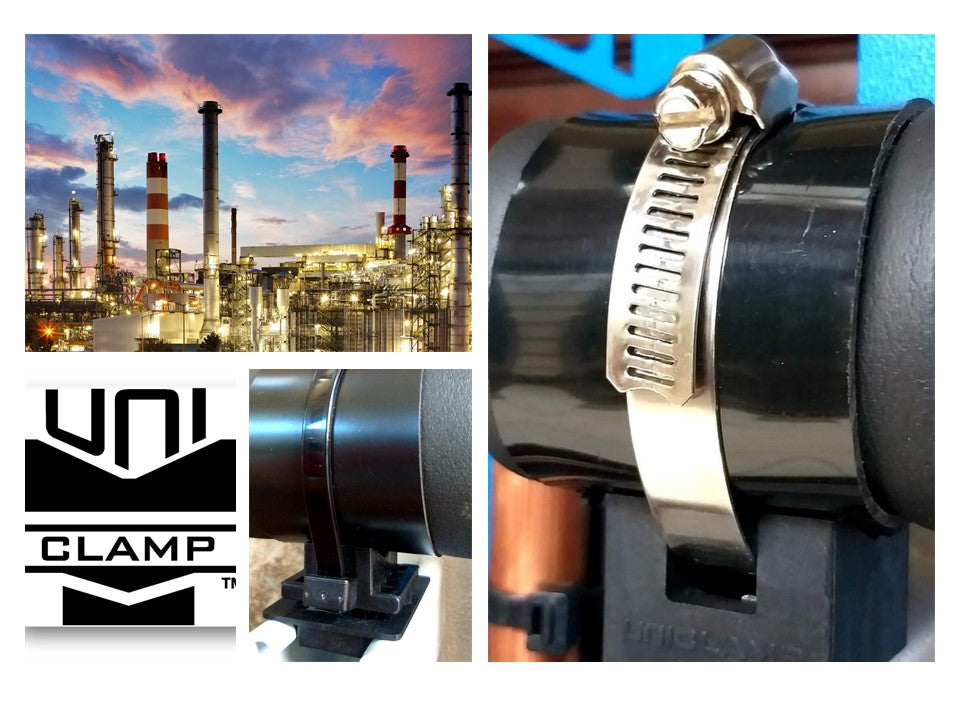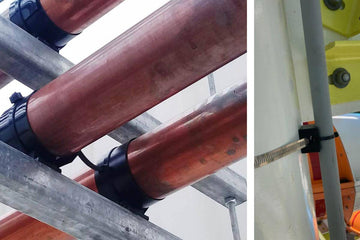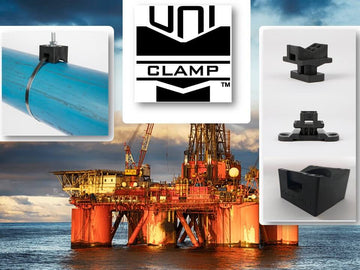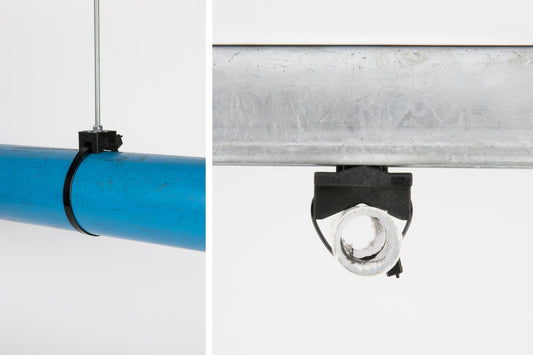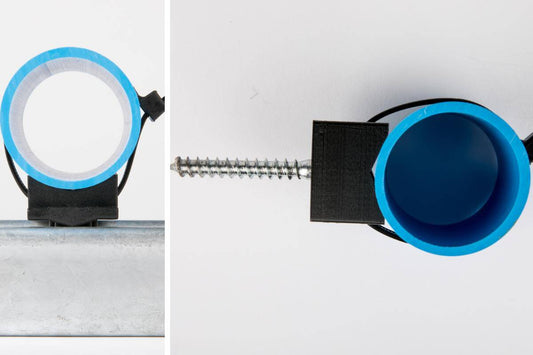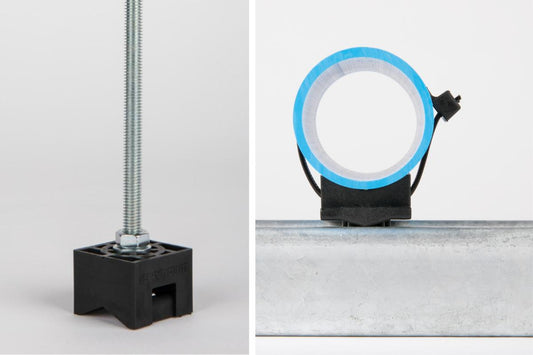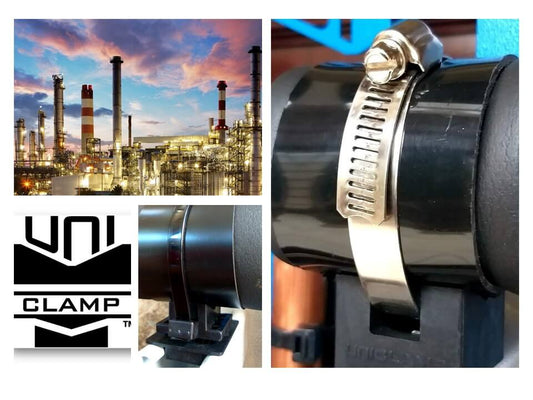In the dynamic and high-stakes world of the petrochemical industry, ensuring efficiency, reliability, and safety is not just a goal but a necessity. As petrochemical operations involve handling volatile and potentially hazardous materials, the equipment used must meet stringent standards to prevent failures and accidents. Among the critical components in this sector are pipe clamps, which play a crucial role in securing pipelines that transport various hydrocarbons.
Implementing the UNICLAMP Strut Pipe Clamp and the V-BAT™ Pipe Clamp in the petrochemical industry represents a significant advancement in addressing these core needs. These clamps are engineered to provide unparalleled performance under the harsh conditions typical of petrochemical environments. They offer exceptional durability, high mechanical strength, and superior resistance to chemicals and extreme temperatures.
Maximizing Efficiency and Safety with Our Uniclamp and V-BAT™ Pipe Clamps
Efficiency
Efficiency in this context involves optimizing processes to maximize output while minimizing input and waste. Reliable equipment is essential for maintaining continuous production, avoiding costly downtimes, and ensuring that operations run smoothly without unexpected failures. High-quality, robust equipment like the UNICLAMP and V-BAT™ pipe clamps is vital for achieving these objectives.
Reliability
Reliability ensures that the equipment and processes function correctly without unexpected failures, crucial for maintaining continuous production and avoiding costly downtimes. Invest in high-quality, reliable equipment such as Our Uniclamp Strut Pipe Clamp and V-BAT™ Pipe Clamp designed to withstand the harsh conditions of petrochemical operations.
Safety
Safety is critical in the petrochemical industry due to the hazardous nature of the materials and processes involved and safety is enhanced by using Our advanced clamps. They ensure secure pipe installation, reducing the risk of leaks and failures that could lead to catastrophic incidents. With their resistance to corrosion and ability to withstand harsh chemical exposures, these clamps contribute significantly to creating a safer working environment for petrochemical facilities.
Hydrocarbons
Hydrocarbons are organic compounds consisting entirely of hydrogen and carbon atoms. They are the primary components of fuels like gasoline, diesel, and paraffin (kerosene), integral to various industries and daily activities. While hydrocarbons are essential, they can also pose corrosive risks to metals. Understanding the corrosiveness of hydrocarbons and the factors that influence them is crucial for maintaining equipment integrity and safety. The UNICLAMP Strut Pipe Clamp and V-BAT™ Pipe Clamp are designed to address these challenges effectively, offering a completely non-corrosive solution for secure and durable pipe installations in the petrochemical industry.
In this blog, we delve into the numerous advantages of the UNICLAMP Strut Pipe Clamp and V-BAT™ Pipe Clamp, exploring why they are the ultimate choice for the petrochemical industry. We will examine their universal fit, high durability, secure pipe installation, temperature and chemical resistance, and relevant certifications. Additionally, we will provide insights into the composition and corrosive nature of various hydrocarbons and the factors influencing their corrosiveness, underscoring the importance of using reliable clamps to combat these challenges.
Why Applying The Uniclamp Strut Pipe Clamp and the V-BAT™ Pipe Clamp in the Petrochemical Industry is the Ultimate Choice
Our Uniclamp Strut Pipe Clamp and V-BAT™ Pipe Clamp are utilized when high mechanical strength, rigidity, good stability under heat, and chemical resistance are required.
Universal Fit
Our UNICLAMP Strut Pipe Clamp and V-BAT™ Pipe Clamp are designed to accommodate a wide range of pipe sizes, from 3/8" to 5" (9mm up to 127mm)
High Durability
Both Our UNICLAMP Strut and V-BAT™ Pipe Clamp are constructed from 30% glass-reinforced nylon 6.6, and both pipe clamps boast a tensile strength of 900 lb and 1100 lbs respectively to withstand extreme conditions and handling (8700 - 12300 psi) Our Uniclamp Strut and V-BAT™ Pipe Clamps are extremely rugged, show superior tensile strength, and reliable, being rust-proof, waterproof, and acid-proof. In addition, it also boasts wear resistance and dimensional stability. Their UV exposure durability ensures a long lifespan of 15-20 years, even in harsh environments.
Want to know more about Our 3-in-1 V-BAT™ Pipe Clamp click here.
Secure Pipe Installation
Heavy-duty strapping provides steadiness and strength to the pipe installation. Stainless steel strapping can carry up to 200 lbs! (the thickness depends on your specific installation). Our Nylon cable ties, made from nylon 6.6 are UV stabilized, and have a carrying capacity of up to 175lbs! Our clamps are specifically designed to ensure that pipes are held firmly in place at all times which is critical in the petrochemical industry.
Temperature Resistant
Maximum temperatures of 572 degrees Fahrenheit qualify our clamps to be used in the petrochemical environment. Our UNICLAMP strut pipe clamp and V-BAT™ pipe clamp hold high lubricity and resistance to hydrocarbons; exceptionally balanced strength, ductility, and heat resistance.
Chemical Exposure
Acid-resistant and 95% resistant to most common chemicals guarantee no deterioration of these clamps when directly exposed to chemicals/acids, especially aliphatic and aromatic hydrocarbons, alkalis, greases, fuels, lubricants, and ketones. There are no observable degradation nor permanent chemical changes.
Certifications
The UNICLAMP strut pipe clamp and the V-BAT™ pipe clamp are certified by UL2239, UL2043, ISO, RoHS, Reach, and Branz, providing trust and peace of mind.
For more information on The types of pipes compatible with The Uniclamp Strut Pipe Clamp and V-BAT™ Pipe Clamp check out our blog.
Gasoline: Composition and Corrosive Nature
Chemical Composition: Gasoline is a complex mixture of hydrocarbons, including alkanes, cycloalkanes, and aromatic hydrocarbons.
Corrosive Nature: Gasoline itself is not highly corrosive to metals. However, impurities such as sulfur compounds and water can cause corrosion. Sulfur, when combined with water, can form sulfuric acid, which is highly corrosive and can damage metal components in engines and storage tanks. Additionally, water in gasoline can promote rust and microbial growth, further contributing to corrosion.
Chemical Compatibility Table 1
|
Gasoline (high-aromatic)
|
A-Excellent
|
|
Gasoline, leaded, ref.
|
A2-Excellent
|
|
Gasoline, unleaded
|
A2-Excellent
|
Diesel: Composition and Corrosive Nature
Chemical Composition: Diesel fuel consists primarily of longer-chain hydrocarbons, including alkanes, cycloalkanes, and aromatic hydrocarbons.
Corrosive Nature: Like gasoline, diesel is not inherently corrosive, however, it can contain impurities such as sulfur and water. Microbial contamination (e.g., bacteria and fungi) in diesel produces organic acids, leading to corrosion in storage tanks and fuel systems. Diesel's tendency to absorb water also promotes rusting and corrosion.
Chemical Compatibility Table 2
|
Oils: Diesel Fuel oil (20, 30, 40, 50)
|
A-Excellent
|
Paraffin (Kerosene): Composition and Corrosive Nature
Chemical Composition: Paraffin, known as kerosene, is a hydrocarbon mixture primarily composed of alkanes and cycloalkanes.
Corrosive Nature: Paraffin is one of the least corrosive hydrocarbons. It is often used as a lubricant for protective coatings due to its low reactivity and minimal corrosive effects. However, like other hydrocarbons, impurities such as sulfur and water can introduce corrosion risks.
Chemical Compatibility Table 3
Factors Influencing Corrosiveness
Sulfur Compounds: Sulfur can lead to the formation of sulfuric acid.
Water: Water can promote rust and microbial growth, leading to the production of organic acids that are corrosive.
Microbial Activity: Certain microbes can thrive in hydrocarbon environments, producing organic acids and other corrosive substances. This is particularly relevant for diesel fuel, which is prone to microbial contamination.
Oxidation: Hydrocarbons can oxidize over time, especially when exposed to air and light. This oxidation can lead to the formation of peroxides and acids that are corrosive to metals.
Conclusion
Understanding the corrosiveness of hydrocarbons like gasoline, diesel, and paraffin is crucial for maintaining the integrity and safety of equipment and pipe installations. By applying Our UNICLAMP strut pipe clamp and the V-BAT™ pipe clamp the concerns of production, and maintenance personnel including management of petrochemical industries are eliminated. These clamps have proven extremely resistant to hydrocarbons, acids, and water, combatting corrosion. Therefore Our V-BAT™ and UNICLAMP Strut Pipe Clamps are the superior choice to enhance efficiency, reliability, and safety.
For more information and to purchase the V-BAT™ and UNICLAMP Strut Pipe Clamps, visit the Uniclamp USA.
Source: Table 1, 2, 3

